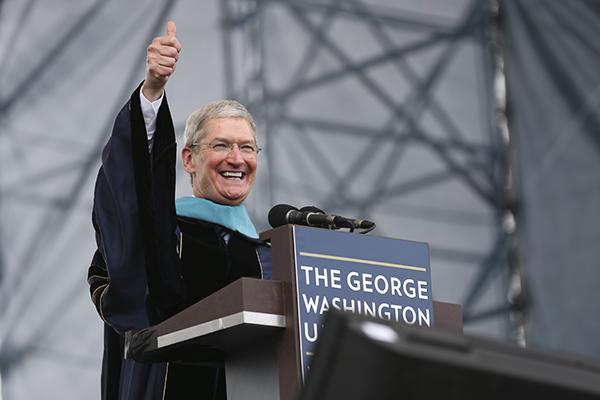Tim Cook never misses an opportunity for product placement.
And even though the Apple CEO’s Commencement address at Sunday’s University-wide Commencement was riddled with references to his tech company, his speech centered on encouraging graduates to do well, do good and find their own “north stars” to guide them through some of life’s hardest questions.
As Cook stood on stage at the base of the Washington Monument, looking out onto the West Wing of the White House, he recalled his first visit to D.C. — a pivotal experience for one of the world’s most powerful business leaders, who then was too poor to even afford a typewriter.
The Alabama native recalled entering an essay competition when he was 16 years old, writing and rewriting his drafts by hand. Cook won the competition, earning him a place on the trip. But before then, he traveled to Montgomery, Ala. to meet then-Gov. George Wallace, a vehement segregationist.
“Shaking his hand felt like a betrayal of my own beliefs. It felt wrong, like I was selling a piece of my soul,” Cook said.
Soon afterward, Cook met President Jimmy Carter, a leader he said fell in line with his own ideals. Cook recalled how Carter later saw the name of Cook’s home county on his name tag, and asked him about the recent storms that had hit Cook’s neighborhood.
Cook said the juxtaposition of the two leaders, who held views on opposite ends of political and moral spectrums, made him realize how much of an impact core values have on shaping a person’s life and choices.
“I had come face to face with two men who guaranteed themselves a place in history,” he said. “Each had made a journey that led them to the values that they lived by, but it wasn’t just about their experiences or circumstances — it had to come from within.”
Cook, who attended both Auburn and Duke universities, told graduates to take advantage of this unique time in their lives to discover, invent and reinvent themselves. He told graduates to find their values and then to live by them, because that is what will have an impact on their careers and the people they lead.

“History rarely yields to one person, but think and never forget what happens when it does. That can be you, that should be you, that must be you,” Cook said.
Cook, who in October was the first CEO of a Fortune 500 company to come out as gay, cited his decision to take a position at Apple under Steve Jobs as a defining moment for his life, repositioning him toward his north star.
When Jobs hired Cook in 1998, Jobs was working on rehabilitating Apple after it had been “adrift and rudderless” for years. Cook said he too was adrift and rudderless in his own career, and had never considered using his values and desire to change the world in his job.
“I was trained to be pragmatic and a problem solver, but now I found myself sitting before this animated 40-something guy with visions of changing the world,” Cook said.
Before arriving at Apple, Cook had worked at competing tech companies including IBM, Intelligent Electronics and Compaq. But it wasn’t until he came to Apple that he felt that his work was making a difference.
Jobs taught Cook to be an idealist in their business and to believe that great products could change the world.
“At Apple, we believe work should be more than just about improving your own self. It’s about improving lives of others as well. Our products do amazing things, and just as Steve envisioned, they’ve empowered people all over the world,” Cook said.
Cook mentioned how iPhones, one of Apple’s most popular products, have been used as powerful tools for change in the past few months. Cell phone videos depicting police brutality have been central to a national discussion on the role of police officers and race relations.
“People who witness injustice and want to expose it, now they can, because they have a camera in their pocket all the time,” Cook said.
Cook was awarded an honorary doctorate of public service by University President Steven Knapp. Other honorary degree recipients were Anthony Fauci, the director of the National Institute of Allergy and Infectious Diseases at the National Institutes of Health, and Carole Watson, the former acting chairman of the National Endowment for the Humanities.
Student speaker Richard Ruiz, a U.S. Marine captain who earned a master’s degree in leadership and education development and was the first person in his family to earn a college degree, focused his speech on imagination as a tool to comprehend the positive changes individuals can make to their futures.
“After nearly losing my life multiple times, I tried to imagine this moment,” Ruiz, who completed a tour of duty in Afghanistan, said. “I tried to imagine a life of education and success and today we have all achieved this through the power of our imagination.”

He said he imagined his own graduation day during tough times in his life as a way to help him persevere, and that having an imagination enables people to improve their situation.
“When we found ourselves submerged in books in Gelman Library trying to find the perfect citation, many of us used a lot of our imaginations,” Ruiz said. “We imagined how one day we would use that knowledge to change the world.”
For the third consecutive year, Knapp repeated his traditional charge to the graduates, telling them to serve as active and engaged citizens.
“I charge you to keep alive the curiosity that has guided you through your studies here, so that whatever work you undertake will constantly be refreshed by new knowledge,” he said.








